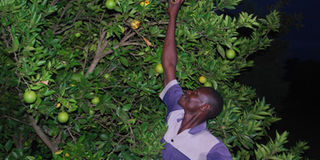Teso fruit farmers decry low prices

Concern. A farmer picks oranges in Kibuku District in September last year. PHOTO BY MUDANGHA KOLYANGHA
What you need to know:
- Ms Jennifer Amuge, a citrus farmer in Bukedea District, says on many occasions, the cooperative union buys oranges from them on credit.
- According to the Soroti Fruit Factory chief executive officer, Mr Douglas Ndawula, they will soon increase production capacity to 129,000 metric tonnes of fruit annually.
Soroti. Fruit farmers in Teso Sub-region are still suffering with surplus produce despite Soroti Fruit Factory commencing production recently.
Farmers attribute this to the factory’s low production capacity, which has resulted in low prices for their produce.
“We have got plenty of harvest this year but due to lack of ready market, our living conditions have not improved. Middlemen want to buy the oranges cheaply,” Mr Samuel Enou, a farmer in Agwara Village, Gweri Sub-county in Soroti District, says.
Mr Enou says he has about 700 trees of ripened citrus and middlemen from Kenya are offering Shs50,000 per bag.
“...Yet the bags they use are almost three times bigger than our ordinary bags,” he says.
Ms Jessica Imalingat from Kapujan Sub-county in Katakwi District urges government to increase the production capacity of Soroti Fruit Factory so as to buy all their fruit.
The factory has a processing capacity of 6,000kg of oranges and 4,000kg of mangoes per hour. Teso so far is said to be having about 8,000,000 trees of oranges.
The factory processes oranges of Hamelin, Washington, and Valencia types, plus improved mangoes.
Farmers, through their umbrella body, Teso Fruit Cooperative Union Ltd (TEFCU) have 20 per cent shares while the government through Uganda Development Corporation (UDC) has 80 per cent shares. According to the initial arrangement, TEFCU is responsible for the supply of fruits to the factory. However, the farmers say the Shs400 at which TEFCU buys a kilogramme of fruits is low.
“How can you buy my oranges at Shs400 per kilogramme yet I have spent a lot of money buying fertilisers and pesticides,” Ms Imalingat says.
She says most farmers have resorted to selling their oranges on the open market.
Mr Isaac Odongo, a farmer from Gweri Sub-county, says Kenyans are now using the baskets being used to transport fish (kisero) to measure their oranges.
“Kisero is fair compared to the ‘tall’ bags that have previously been used to buy oranges from us,” Mr Odongo says.
He says farmers sell more oranges but earn very little money which cannot sustain their families.
“Government built this factory with good intentions but the challenge now is that it has not considered the prices,” Mr Joseph Okello, a resident of Serere District, says.
Mr Jorem Opian Obicho, the chairperson of TEFCU, urges farmers to join cooperative societies so that they can negotiate better prices for their fruit.
“Currently, we buy from our farmers at Shs400 and sell to the factory at Shs500 but still the factory’s capacity cannot afford to take all,” he says.
Ms Jennifer Amuge, a citrus farmer in Bukedea District, says on many occasions, the cooperative union buys oranges from them on credit.
According to the Soroti Fruit Factory chief executive officer, Mr Douglas Ndawula, they will soon increase production capacity to 129,000 metric tonnes of fruit annually.




